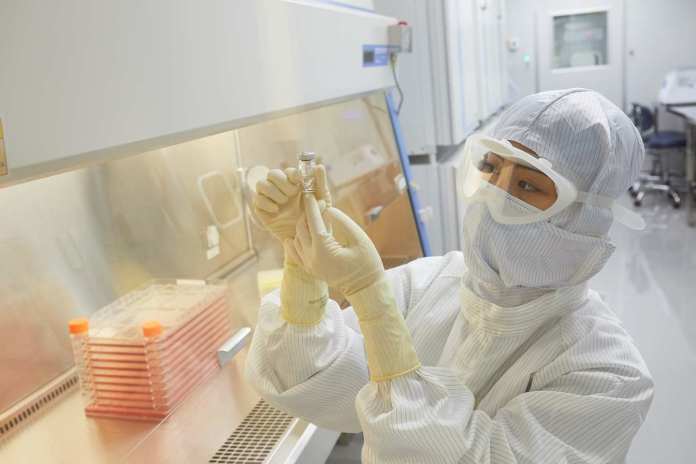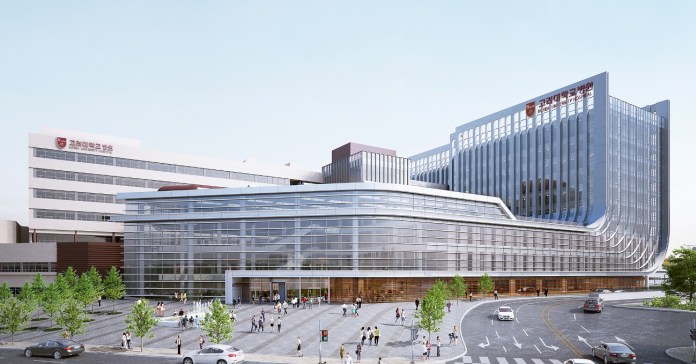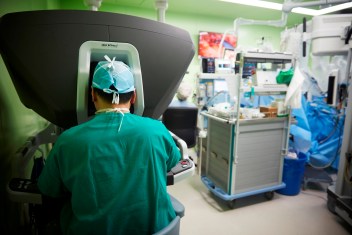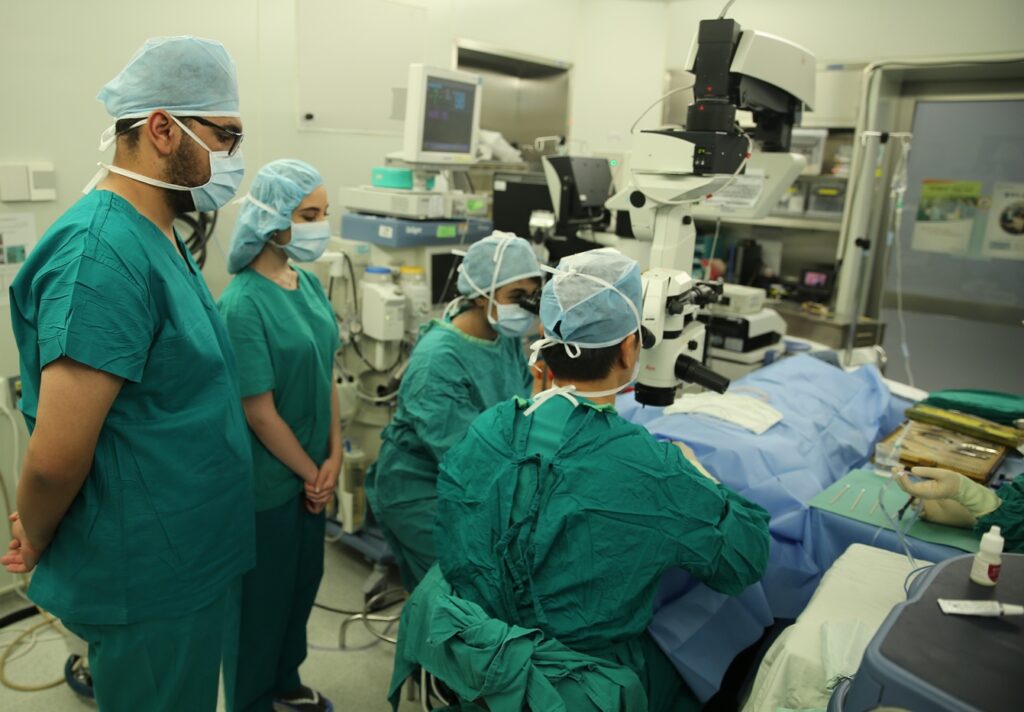South Korea provides some of the most advanced healthcare in the world. With highly skilled physicians, hospitals equipped with cutting-edge technology and a robust culture of medical research, patients from around the world regularly visit the country for complex medical treatments. The country is well known for this in the Middle East.
Supported by a long history and deep knowledge of healthcare, the Korea Health Industry Development Institute (KHIDI) established the Medical Korea Academy which hosts specialists from around the world who come to South Korea to further enhance their medical skills.
In this article KHIDI provides an overview of some of the leading hospitals in the country and looks at their specialties.
Gangnam Severance Hospital

Gangnam Severance Hospital first opened its doors to the public in Gangnam, Seoul in 1983, at a time when the area lacked high-quality medical services. With the opening of the international Healthcare Center in October 2003, Gangnam Severance Hospital began a full-scale rise as the leader in treating non-Korean patients. In 2019, more than 1,400 non-Korean outpatients visited the hospital on a monthly basis, and more than 350 non-Korean patients per month received hospitalized treatment.

Gangnam Severance Hospital is recognized for its high satisfaction level among international patients. It recorded a score of 94.5 on the 2021 satisfaction survey for international patients who have experienced healthcare services in Korea conducted by The Korea Health Industry Development Institute. This far exceeds the average score of 89.9 for all healthcare providers.
The main reason why international patients prefer Gangnam Severance Hospital is its exclusive fast-track programme designed to offer tailored services. The comprehensive programme seamlessly connects “health screening”, “outpatient care”, and “hospitalized treatment and surgery” by fully capitalizing on its status as an upper-tier general hospital equipped with a cutting-edge physical examination centre. This enables more expedited and pinpointed treatment compared to other hospitals, offering a significant advantage for those who are staying in Korea for a limited period of time.

The departments most frequently visited by international patients are Breast Surgery, Obstetrics and Gynaecology, Thyroid and Endocrine Surgery, Urology, Chest Surgery, and Cardiovascular Surgery.
Gangnam Severance Hospital specializes in the treatment of hard-to-cure, advanced cancers that affect women, such as breast, ovarian, and thyroid cancers.
In 2021, Gangnam Severance Hospital introduced Elekta Unity for magnetic resonance radiation therapy with real-time image-tracking capabilities for the first time in Korea. Unlike CT and X-ray, Elekta Unity utilizes 1.5 MRI to allow physicians to track the motions of tumours and adjust radiotherapy plans accordingly in real-time.
It also offers more accurate information on the boundaries between normal tissue and cancer cells to ensure safer precision treatment focused only on tumours. In particular, Elekta Unity distinguishes soft-tissue tumours from the surrounding organs more accurately. As such, it offers groundbreaking treatment for some metastatic cancers as well as lung and breast cancers.
- For more information, e-mail: gnseverance1@yuhs.ac
Seoul National University Hospital

Seoul National University Hospital (SNUH) has been leading the medical development of Korea as the country’s representative national university medical institution. Seoul National University Main Hospital (Yeongeon Campus) is home to the SNU Children’s Hospital, SNU Cancer Hospital, and SNUH Biomedical Research Institute. In Korea, it operates SNU Bundang Hospital, SNUH Healthcare System Gangnam Center, SMG-SNU Boramae Medical Center, and the National Traffic Injury Rehabilitation Hospital; while overseas, it is commissioned to operate the Sheikh Khalifa Speciality Hospital in the United Arab Emirates. As of 2021, 1,793 beds were in operation, and over 8,000 employees, including 1,621 doctors, were taking care of about 6,720 outpatients per day.

In particular, SNU Children’s Hospital has become a world-class institution since it opened as the only paediatric specialty hospital in Korea in 1985. The Children’s Hospital is operated with 17 specialized departments for children, 13 sub-specialties within the Department of Pediatrics, 40 beds in the neonatal intensive care unit, and 22 beds in the paediatric intensive care unit. SNU Children’s Hospital is the only hospital in Korea to have 10 dedicated operating rooms for children and performs an average of 10,000 surgeries per year, and to ensure the safety of patients, paediatric anaesthesiologists are responsible for the safety of anaesthesia.
Case example
A young girl from the United Arab Emirates came to Korea in March 2019 after being diagnosed with hepatoblastoma in Thailand and was treated at SNU Children’s Hospital. Initially, her tumour size was huge and was invading important blood vessels, which made immediate surgery difficult, so long-term chemotherapy was adopted first. Liver transplantation was also considered in case of an emergency. So, the father of the patient went through various difficult steps, such as getting a donor test and approval to make preparations for the liver transplant. However, after about a year of chemotherapy, a right hemi-hepatectomy was performed in March 2020. The operation was successful and a liver transplant was not required. After about 2-3 months of additional chemotherapy, the excision of the diaphragmatic mass was also successfully performed in June, allowing the patient and her parents to return home safely, where the young girl continues to lead a healthy life.

2022 Medical Korea in UAE
At the “2022 Medical Korea in UAE” event, which was held in the last week of October, Professor Kim Woong-Han of the Department of Pediatric Thoracic
& Cardiovascular Surgery at SNUH gave lectures on the latest trends in surgery for congenital heart diseases. Prof. Kim is renowned for the successful surgery of the narrowest aorta coarctation in Korea where a 3cm-wide heart of an extremely premature baby weighing just 590g had to be opened. In addition to surgery and treatment for sick children, he has been supporting many foreign countries’ medical staff in the treatment of heart diseases by helping with medical infrastructure and training for cardiac surgery in Côte d’Ivoire, Nepal, and Uzbekistan.
- For more information, email: arab@snuh.org or call: +82-2-2072-1817
Samsung Medical Center
Cancer treatment specialists

Samsung Medical Centre (SMC) established Asia’s first ‘Comprehensive Cancer Center’ in 2008. The facility houses 700 beds, cancer care units and laboratories across 19 floors, offering groundbreaking oncological treatment to patients from all over the globe. Currently, 10 percent of South Korean patients choose SMC for their cancer care.
Prominent U.S. news magazine, Newsweek, ranked Samsung Medical Center as South Korea’s number one cancer treatment facility, and sixth globally, just behind the Mayo Clinic, Rochester. Samsung Comprehensive Cancer Center (SCCC), its state-of-the-art patient care, and its 14 years of operation, has therefore been recognized and endorsed both domestically and internationally.





In 2015, a US$100 million investment by SCCC brought a new proton therapy centre online, introducing a cutting-edge cancer therapy option. As a result, a number of cases of diverse, complex cancers including childhood cancer, brain tumours, head and neck cancer, liver and lung cancer, have been successfully treated. The Cancer Center’s pursuit of innovation in treatment is unstinting. Advanced technology, such as the robotic da Vinci Surgical System, has been extensively applied to target prostate cancer, as well as the Gamma Knife Icon for brain tumours. Furthermore, establishing Korea’s first CAR-T Cell Therapy Center in 2021 has enabled SCCC to lead the field in blood cancer therapy as well. Harnessing new technologies, SMC’s premier cancer experts have worked relentlessly to make integrated multi-disciplinary diagnosis a reality, and adopted genome analysis-driven precision medicine therapy to boost survival rates in cancer patients.
5-year relative survival rate from SMC
Tireless devotion to providing the best cancer care has seen SCCC patients top the average five-year survival rates, far outstripping other hospitals’ performance since the 2000s, both in Korea and the U.S. Samsung Comprehensive Cancer Center’s efforts have
secured unparalleled treatment accomplishments and improved survival rates, year-on-year.

The Samsung Medical Center, since founding the SCCC, continues to develop as a proven, world-class oncology institution offering comprehensive, integrated cancer treatments, preventive measures, ongoing research and therapeutic studies.
Seoul National University Bundang Hospital

Seoul National University Bundang Hospital (SNUBH) is a 1,360-bed tertiary care academic hospital. SNUBH has a staff of more than 2,700 physicians and nurses at 12 specialized centres and 35 departments serving 1.6 million patients a year. Since its opening in 2003, it has grown into a premier national and international leader in patient care, research, and education. Every year international evaluations and surveys of hospitals worldwide, rank SNUBH among the Korea’s top 5 hospitals.

Global Healthcare Accreditation
SNUBH is the first hospital in Korea accredited by the GHA (Global Healthcare Accreditation) programme, an innovative accreditation body with specialized focused on international patient services. This accreditation is proof of the world class standards at SNUBH, validating their clinical expertise and joining a prestigious group of global healthcare institutions, such as Cleveland Clinic in U.S. and Bumrungrad International Hospital in Thailand.
Home away from home
SNUBH’s International Healthcare Center (IHC) was established in 2014. It is widely recognized for its unparalleled services that ensure the satisfaction of international patients from around the world as well as domestic patients. It also boasts an integrated patient care model that enables patients to access all essential services in a comprehensive manner. The IHC offers translation, escort, and counselling services throughout the medical process from appointment, treatment, billing, examination and administration.
SNUBH is dedicated to delivering the highest quality, compassionate care and service to every one of their patients and their families in a warm and friendly environment. From the warmth of our welcome to the quality of our care, international patients will remember the SNUBH experience as a home away from home.
Introducing Professor Sung Ki-hyuk

Professor Sung Ki-hyuk is a paediatric orthopaedic surgeon at SNUBH. He treats limb deformities (bowlegs, cross legs, leg length discrepancy, and foot deformity). Neuromuscular diseases (Cerebral palsy, arthrogryposis, muscular atrophy, etc.), hip dislocation paediatric injuries, growth plate damage, and youth sports injuries. Every year the achievements and results of diagnosis and surgical treatment with the use of state-of-the-art operative techniques, and pre/post-operative surgical management are presented in international journals and conferences.
Seoul St. Mary’s Hospital, the Catholic University of Korea

Seoul St. Mary’s Hospital is a flagship hospital of the Catholic Medical Center equipped with world-class medical staff and state-of-the-art medical facilities. The largest single-building hospital in Korea has achieved outstanding clinical and research outcomes, performing the first kidney transplantation, hematopoietic stem cell transplantation (HSCT), and small bowel transplantation in Korea based on its 80 years of experience and the most extensive medical network in the country. It is globally recognized for its safe hospital environment demonstrat- ed by obtaining JCI accreditation five consecutive times as of 2022.
Catholic Hematology Hospital — Korea’s first hospital specialized in blood diseases
Seoul St. Mary’s Hospital upgraded the status of the BMT centre to the Catholic Hematology Hospital in order to maintain and further enhance its competitiveness in treating blood diseases at home and abroad based on its globally unparalleled expertise.
As the first haematology hospital in Korea and the largest in Asia with an independent system to comprehensively treat blood diseases, the Catholic Hematology Hospital holds one of the world’s best treatment outcomes for haematologic cancer and acute myeloid leukaemia, and is recognized worldwide for its expertise. After performing successful allogeneic hematopoietic stem cell transplantation (HSCT) for the first time in Korea in 1983, it holds “Korea’s first” titles in HSCT as follows: first to perform autologous HSCT (1985), unrelated HSCT (1995), umbilical cord blood transplantation (1996), non-myeloablative HSCT (1998), and related haploidentical HSCT (2001). The hospital performs about 600 HSCTs every year. In March 2021, despite the global COVID-19 pandemic, it became the first hospital in the world to perform 9,000 HSCTs at a single institution. Since it conducted a sibling HSCT on a patient from the United Arab Emirates in 2012, the hospital has performed the transplant on an increasing number of international patients (more than 100 cases).

The Catholic Hematology Hospital carries out approximately 20% of domestic HSCTs, and as for allogeneic HSCT, which is more complex than autologous transplantation, the hospital accounts for 74.3% of the total number of domestic cases.
CAR T-cell therapy
The Catholic Hematology Hospital has successfully treated a paediatric patient with Philadelphia chromosome-positive (Ph+) acute lymphoblastic leukaemia (ALL) with chimeric antigen receptor (CAR) T-cell therapy, called “Kymriah”. CAR T-cell therapy is an advanced cell therapy that finds and destroys tumour cells by combining immune cells called T cells to a protein called chimeric antigen receptor. The targeted cancer therapy has emerged as a new, innovative treatment paradigm for patients with rare blood cancers. This advanced biomedicine, whose high treatment effectiveness has been proven, can give hope to treatment non-responders and those with relapsed blood cancer.
- For more information: International Health Care Centre of Seoul St. Mary’s Hospital Website: www.cmcseoul.or.kr/ar.common.main.main.sp
Email: ihcc@catholic.ac.kr Tel: +82-2-2258-5745
Korean University Anam Hospital

Korean University Anam Hospital’s Professor Kim Hoon-yub, the founder of Trans-Oral Robotic Thyroidectomy (TORT), has performed the most TORT procedures in the world, recently surpassing 1000 surgeries.

TORT is recognized as the world’s most advanced for its technological perfection and clinical safety. It is a surgical procedure that precisely removes only the thyroid gland without damaging other tissues and organs by inserting a robotic arm into the mouth and minimizing side effects and post-operative discomfort. Within a month after surgery, the scars in the mouth disappear, and the post-operative pain is significantly less than existing robotic thyroidectomies. In addition, the patient’s satisfaction is high because the thyroid gland is precisely excised at the nearest site and there is little change in the voice after surgery.
Professor Kim Hoon-yub made headlines when he imparted surgical know-how to world-renowned hospitals, including Johns Hopkins University Hospital and the Cleveland Clinic in the United States. In addition, there are constant visits to Prof. Kim from the Americas, Europe, and Asia to learn his surgical techniques. He is often invited to perform live surgeries in various countries around the world, proving that there is great interest in his TORT procedures.

When the development of TORT was made known, it received great attention not only for its effectiveness, but also for its approach to the mouth. After surgery, no matter how small the scar may be, an indelible memory of the patient’s illness remains. However, since this method is trans-oral, it leaves no scars at all. Trans-oral robotic thyroidectomy will serve as a role model for researching and developing new surgical methods as truly patient-centred medical care.
- For more information: Email: kumcihc@korea.ac.kr
(International Healthcare Center)
07nader@kumc.or.kr (Arabic Coordinator)
Or call: +82-2-920-5677 (International Healthcare Center)
Severance Hospital

Severance Hospital, established in 1885, is Korea’s first western-style medical institution and represents the history of Korea’s medical care. Severance Hospital was the first hospital in Korea to receive JCI accreditation, an international medical institution accreditation and certification, and is recognized as a hospital that provides medical services at an international level. In addition, Severance Hospital has performed over 30,000 robotic surgeries which is the first record in the world, and
The world’s most advanced robotic surgery technology

Robotic surgery is used for treating various cancer diseases, such as thyroid cancer, colorectal cancer, stomach cancer, liver cancer, prostate cancer, and kidney cancer. It minimizes scarring and reduces the amount of bleeding, which allows stable treatment and fast recovery for patients. Severance Hospital performed the first robotic surgery in Korea in 2005. Since then, as of 2021, for the first time in the world, 30,000 robotic surgeries using the Da Vinci Robotic Surgical System have been performed.
Heavy ion therapy system

Severance Hospital is planning to offer treatment with a heavy ion therapy system in 2023. It is a state-of-the-art cancer treatment system that only 10 institutions have around the world.
The heavy ion therapy device maximizes therapeutic effects by precisely targeting cancer tissues with radiation while minimizing side effects to normal tissue. This new state-of-art technology can replace traditional cancer treatments such as radiation, x-rays, or gamma radiation. Its effectiveness is 2.5 to 3 times higher than that of conventional radiation therapy.

The top 3 cancers of Korea (lung cancer, liver cancer, and pancreatic cancer) can be treated by this new method, and it can also tackle incurable cancers such as bone and soft tissue sarcomas, chordoma, recurrent rectal cancer, head and neck cancer, and malignant melanoma. Severance Hospital will open the new Heavy Ion Therapy Center in 2023.
- For more information: Email: arab@yuhs.ac or call: +87-2-2228-5847
Medical professionals head to South Korea for world-class training
Medical Korea Academy offers a platform for foreign specialists to learn cutting-edge techniques and treatments
- By Korea Health Industry Development Institute
South Korea is proving to be a leader in the healthcare industry, with its advanced medical infrastructure and innovative practices that result in notable clinical trials and reputable treatment and surgical successes.


With its pioneering medical practices for a wide range of specialties, medical professionals from around the world have sought South Korea as the place to advance their medical knowledge and techniques. In the past, Dr James Eason, Director of the Methodist University Hospital Transplant Institute and renowned surgeon who performed a complete liver transplantation on Steve Jobs, visited South Korea to learn from the hospital’s liver transplant team, who developed new surgical methods that prioritized safety.
With a goal to improve global healthcare, the Medical Korea Academy (MKA), hosted by the Korea Health Industry Development Institute (KHIDI), is a training programme that aims to pass on South Korea’s cutting-edge medical skills and knowledge to foreign specialists. Each year, physicians from the U.S., Europe, and the Middle East travel to South Korea to participate in training programmes provided by various hospitals. Between 2007 and 2020, 1,392 medical professionals from 53 countries took part in the MKA programme, with the top five countries to send the highest number of medical practitioners being Saudi Arabia (314), Mongolia (250), Russia (146), China (116), and Kazakhstan (115).
Medical training programme for Middle Eastern physicians and dentists
Established for medical professionals located in the Gulf, the Middle Eastern Physicians and Dentists Korea Medical Training Program (KMTP) has proven to be a great success. Following an agreement with Saudi Arabia in September 2013, medical professionals have been able to visit South Korea to receive world-class training in a variety of specialties. Especially with many female patients from the Middle East visiting South Korea for cancer treatment, Medical Korea Academy offers a platform for foreign specialists to be educated on the advanced medical practices for such malignant and chronic conditions, enabling advanced local treatment options in their own countries.
With the growing reputation of KMTP, a total of 161 Saudi Arabia physicians have successfully completed the programme between 2014 and 2020. In addition, KMTP has signed agreements to train specialists with the Kuwait Ministry of Health in May
2016, the Dubai Health Authority and Bahrain Defense Force-Royal Medical Services in 2018, and the Oman Medical Specialty Board in 2019. In total, 311 Middle Eastern physicians have participated in the programme since 2014.
These agreements have given medical professionals in the Middle East an opportunity to learn about the latest medical practices available in Korea with access to research activities, academic conferences, and other insightful educational opportunities about the cutting-edge care provided in the country.
Dr Adel Saeed Alghamdi, from Saudi Arabia, who visited Korea for increased specialization in his field commented: “I decided to come to Korea because I knew that Korea has a high level of education in medical science and is scientifically and technologically advanced.”
He added: “Because I came to Korea with my family, I was able to experience many aspects of Korean culture and environment.
I have not only learned medical skills, but also how to allocate difficult tasks, continuously update new medical information, and work as a team with new technology from the professors and my colleagues.”
Similar to Dr Alghamdi’s story, the programme has been able to provide countless physicians with the opportunity to receive advanced medical training in clinical specialties ranging from anaesthesiology and pain medicine diagnostics to radiology and neurosurgery.
How to join the programme?
To join the programme, participants can apply online and select their specific department and hospital faculty. Visas are then organized and a pre-training programme follows, which consists of mandatory Korean language training and observational training at a hospital. Candidates can then apply to participate in a hands-on medical training programme at the hospital which can range from one to two years. By participating, medical practitioners can look forward to expanding their medical knowledge and then returning to their own hospitals with the latest, state-of-the-art treatments. In addition, with the ongoing Covid-19 pandemic, MKA also provides an e-class – an online education system that informs medical professionals about the latest medical practices, including surgical techniques for conditions such as pancreatic, gastrointestinal and colorectal cancer.
- To learn more, visit: http://mka-eclass.or.kr




